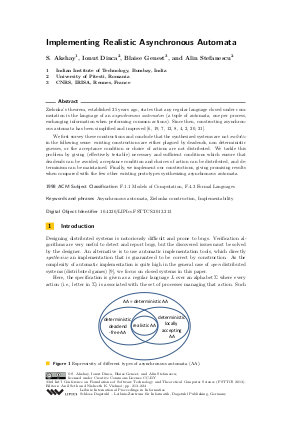Implementing Realistic Asynchronous Automata
Authors S. Akshay, Ionut Dinca, Blaise Genest, Alin Stefanescu
-
Part of:
Volume:
IARCS Annual Conference on Foundations of Software Technology and Theoretical Computer Science (FSTTCS 2013)
Part of: Series: Leibniz International Proceedings in Informatics (LIPIcs)
Part of: Conference: IARCS Annual Conference on Foundations of Software Technology and Theoretical Computer Science (FSTTCS) - License:
 Creative Commons Attribution 3.0 Unported license
Creative Commons Attribution 3.0 Unported license
- Publication Date: 2013-12-10
File

PDF
LIPIcs.FSTTCS.2013.213.pdf
- Filesize: 0.56 MB
- 12 pages
Document Identifiers
Subject Classification
Keywords
- Asynchronous automata
- Zielonka construction
- Implementability
Metrics
- Access Statistics
-
Total Accesses (updated on a weekly basis)
0Document
0Metadata
Abstract
Zielonka's theorem, established 25 years ago, states that any regular language closed under commutation is the language of an asynchronous automaton (a tuple of automata, one per process, exchanging information when performing common actions). Since then, constructing asynchronous automata has been simplified and improved ([Cori/Métivier/Zielonka,1993],[Klarlund/Mukund/Sohoni,1994], [Diekert/Rozenberg,1995], [Genest/Muscholl,2006], [Genest/Gimbert/Muscholl/Walukiewicz,2010], [Baudru/Morin, 2006], [Baudru,2009], [Pighizzini,1993], [Stefanescu/Esparza/Muscholl,2003]). We first survey these constructions and conclude that the synthesized systems are not realistic in the following sense: existing constructions are either plagued by deadends, non deterministic guesses, or the acceptance condition or choice of actions are not distributed. We tackle this problem by giving (effectively testable) necessary and sufficient conditions which ensure that deadends can be avoided, acceptance condition and choices of action can be distributed, and determinism can be maintained. Finally, we implement our constructions, giving promising results when compared with the few other existing prototypes synthesizing asynchronous automata.
Cite As Get BibTex
S. Akshay, Ionut Dinca, Blaise Genest, and Alin Stefanescu. Implementing Realistic Asynchronous Automata. In IARCS Annual Conference on Foundations of Software Technology and Theoretical Computer Science (FSTTCS 2013). Leibniz International Proceedings in Informatics (LIPIcs), Volume 24, pp. 213-224, Schloss Dagstuhl – Leibniz-Zentrum für Informatik (2013)
https://doi.org/10.4230/LIPIcs.FSTTCS.2013.213
BibTex
@InProceedings{akshay_et_al:LIPIcs.FSTTCS.2013.213,
author = {Akshay, S. and Dinca, Ionut and Genest, Blaise and Stefanescu, Alin},
title = {{Implementing Realistic Asynchronous Automata}},
booktitle = {IARCS Annual Conference on Foundations of Software Technology and Theoretical Computer Science (FSTTCS 2013)},
pages = {213--224},
series = {Leibniz International Proceedings in Informatics (LIPIcs)},
ISBN = {978-3-939897-64-4},
ISSN = {1868-8969},
year = {2013},
volume = {24},
editor = {Seth, Anil and Vishnoi, Nisheeth K.},
publisher = {Schloss Dagstuhl -- Leibniz-Zentrum f{\"u}r Informatik},
address = {Dagstuhl, Germany},
URL = {https://drops.dagstuhl.de/entities/document/10.4230/LIPIcs.FSTTCS.2013.213},
URN = {urn:nbn:de:0030-drops-43742},
doi = {10.4230/LIPIcs.FSTTCS.2013.213},
annote = {Keywords: Asynchronous automata, Zielonka construction, Implementability}
}
